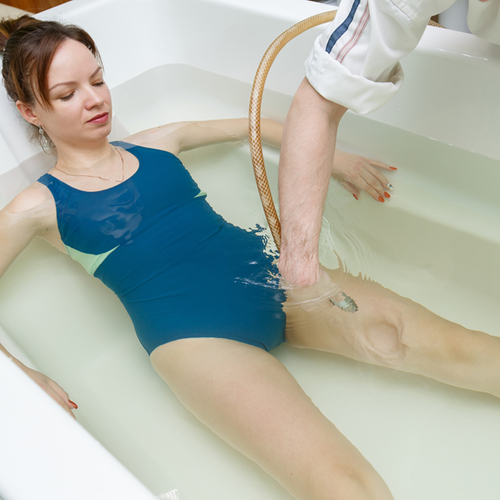
Aquatic exercise
Alternate names: Ai Chi, Aqua Lymphatic Therapy, Aquatic Physical Therapy, Hydrotherapy, Motion-Based Hydrotherapy, Physiothérapie Aquatique, Pool Therapy, Thérapie Aqua-Lymphatique, Thérapie Physique Aquatique
Actions: Gastrointestinal, Immunologic, Muscular
Background
Aquatic exercise is a type of low-impact exercise that is done in water.
Aquatic exercise is most commonly used for pain-related conditions such as arthritis and back pain. It is also used for fibromyalgia, a lung disease that makes it harder to breathe (chronic obstructive pulmonary disease or COPD), and other conditions, but there is no good scientific evidence to support these uses.
Aquatic exercise is most commonly used for pain-related conditions such as arthritis and back pain. It is also used for fibromyalgia, a lung disease that makes it harder to breathe (chronic obstructive pulmonary disease or COPD), and other conditions, but there is no good scientific evidence to support these uses.
Safety Safety definitions
Aquatic exercise is LIKELY SAFE when used appropriately and short-term. Water exercises have been performed safely for up to 12 weeks. Side effects are rare but might include dizziness, fatigue, and muscle pain.
Breast-feeding: Not enough is known about the use of aquatic exercise during breast-feeding. But there is no reason to expect any adverse effects.
Heart disease: There is some concern that aquatic exercise in warm or hot water might worsen heart problems. Hot water can increase heart rate and decreased blood pressure. Use caution or avoid aquatic exercise that involves hot water in people with heart problems.
Low blood pressure: Immersion in hot water might decrease blood pressure. Aquatic exercise in hot water might increase the risk of blood pressure becoming too low in people with this condition.
Special Precautions & Warnings:
Pregnancy: Aquatic exercise is POSSIBLY SAFE when used appropriately during pregnancy. Aquatic exercise seems safe when practiced for up to 45 minutes in water that is not too hot. But aquatic exercise that involves exposure to hot temperatures is POSSIBLY UNSAFE during pregnancy.Breast-feeding: Not enough is known about the use of aquatic exercise during breast-feeding. But there is no reason to expect any adverse effects.
Heart disease: There is some concern that aquatic exercise in warm or hot water might worsen heart problems. Hot water can increase heart rate and decreased blood pressure. Use caution or avoid aquatic exercise that involves hot water in people with heart problems.
Low blood pressure: Immersion in hot water might decrease blood pressure. Aquatic exercise in hot water might increase the risk of blood pressure becoming too low in people with this condition.
Effectiveness
NatMed Pro rates effectiveness based on scientific evidence according to the following scale: Effective, Likely Effective, Possibly Effective, Possibly Ineffective, Likely Ineffective, Ineffective, and Insufficient Evidence to Rate.
Possibly effective Effectiveness definitions
- Back pain. Aquatic exercise seems to improve pain and physical function in people with low back pain. It might even work better than land exercise.
- Osteoarthritis. Aquatic exercise seems to reduce pain and slightly improve disability and quality of life in people with osteoarthritis. It seems work as well as exercise on land. But some people with osteoarthritis prefer aquatic exercise.
- Rheumatoid arthritis (RA). Aquatic exercise seems to improve motion, joint tenderness, and symptom severity in people with RA.
Dosing & administration
The appropriate or safe use of aquatic exercise depends on several factors such as the condition being treated or the person administering the treatment. Be sure to seek and follow relevant directions from your physician or other healthcare professional before using this treatment.
Interactions with pharmaceuticals
It is not known if this treatment interacts with any medicines. Before using this treatment, talk with your health professional if you take any medications.
Interactions with herbs & supplements
There are no known interactions with herbs and supplements.
Interactions with foods
There are no known interactions with foods.
Action
Aquatic exercise is exercise in water. The water provides resistance. This might help build muscles. Exercising in water is also low-impact. This might make it less painful for people with pain or difficulty moving.
vital.ly has licensed monographs from TRC Healthcare.
This monograph was last reviewed on 12/09/2024 10:00:00 and last updated on 25/08/2015 02:43:34. Monographs are reviewed and/or updated multiple times per month and at least once per year.
Natural Medicines disclaims any responsibility related to medical consequences of using any medical product. Effort is made to ensure that the information contained in this monograph is accurate at the time it was published. Consumers and medical professionals who consult this monograph are cautioned that any medical or product related decision is the sole responsibility of the consumer and/or the health care professional. A legal License Agreement sets limitations on downloading, storing, or printing content from this Database. No reproduction of this monograph or any content from this Database is permitted without written permission from the publisher. It is unlawful to download, store, or distribute content from this site.




